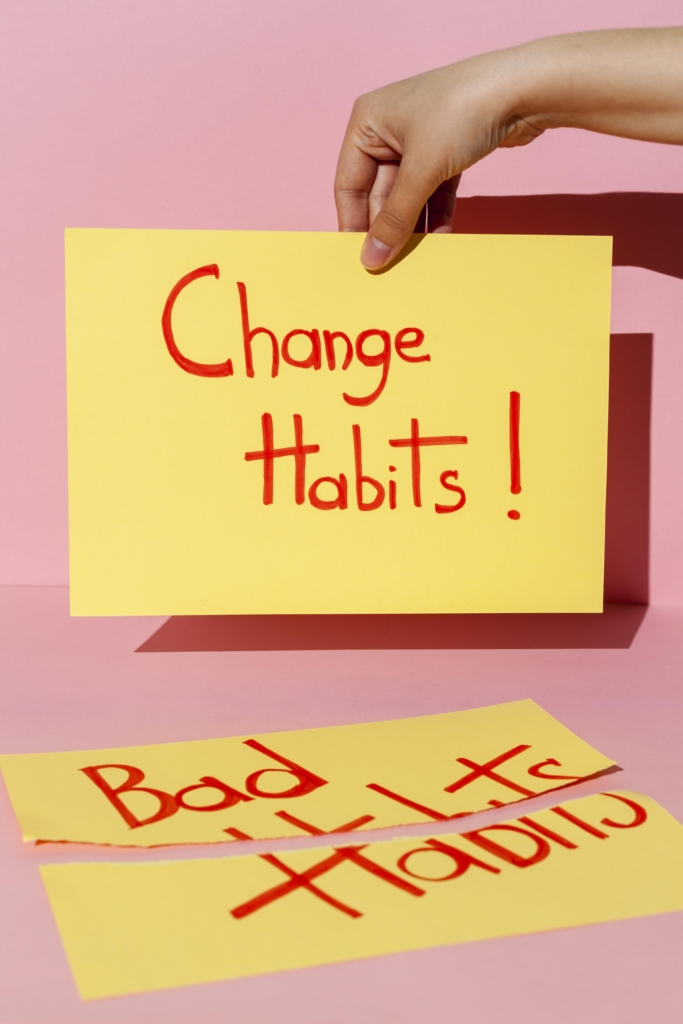Currently Empty: $0.00
Habits
The Power of Habits

The Power of Habits : How to Replace Bad Habits with Good Ones ?
Today, in this blog post, we’re exploring the powerful impact that habits have on our lives, as well as ways in which to develop better ones and replace bad ones with positive ones. Join me as we discover ways of making lasting change!
Understanding Habits
Habits play an integral part in shaping our lives, from making or breaking us to our daily routines and behaviors, which often go without our notice – these habits have a significant bearing on our overall well-being, success and personal growth.
Habits have the power to either shape us or break us. Our daily actions, whether good or bad, may either contribute to or detract from us and our goals. Habits have the power to shape our lives significantly. Engaging in healthy practices such as regular exercise, healthy diet, and consistent self-reflection can foster personal development, improved health and success; conversely, negative ones such as smoking, excessive drinking or making poor food choices may stymie progress and keep us from reaching our full potential.
Recognising the power of habits can help us realise their impact on our lives, so by being conscious about them; we can make conscious choices to develop healthy ones that meet our goals and values.

Replacing bad habits with positive ones is the cornerstone of personal development
One of the cornerstones of personal growth lies in being able to replace harmful habits with beneficial ones. Breaking free from destructive patterns may prove challenging but essential in furthering personal progress. Self-discipline and willpower play key roles when trying to break through bad habit patterns.
Replacing bad habits requires recognising their triggers and finding alternative behaviours or coping mechanisms. For instance, if stress leads to unhealthy eating patterns, finding effective stress relief strategies, like meditation or exercise, may help break this cycle and break your habitual patterns of unhealthy eating habits.
Maintaining good habits requires dedication and diligence if they’re to be changed permanently, taking some time for results to show themselves, but this process itself serves an integral purpose of personal development.
Everyone, even successful individuals, has bad habits that they need to address
No one is immune from developing bad habits, even successful individuals. Even leaders within their industries likely struggle with and overcome several unwanted habits over time – the difference lies in being able to recognise and address such behaviours efficiently.
Successful individuals recognise the influence that habits have on their lives and strive constantly to enhance themselves. They’re aware of any habits that hinder progress and actively work on replacing them – this commitment to growth and self-improvement distinguishes successful people from others.
In conclusion, habits can have an enormous effect on our lives, whether positive or negative. They have the power to either propel us towards success and personal development or hold us back – replacing bad ones with positive ones is central to personal development; by becoming aware of them and making conscious choices, we can pave our paths toward a brighter future.
The Power of Conscious Replacement

Conscious replacement is an approach designed to help individuals break free of negative habits and replace them with positive ones. This method involves recognising your undesirable patterns of behaviour and their triggers, replacing those habits consciously with suitable alternatives, and practising those changes until they have become part of your daily life routine.
Identify your bad habits and their triggers
The first step to harnessing conscious replacement is identifying your bad habits and understanding what drives them – this may include situations, emotions or specific individuals that you associate with them. By understanding why and how these negative patterns emerge in our lives, you can gain greater insight into them while beginning to devise plans to break free of them.
For example, if you find yourself mindlessly snacking when feeling stressed, one step in breaking this pattern might be to recognise what situations prompt such behaviour. Then, choose healthier activities instead of snacking, such as going for a short walk or practising deep breathing exercises.
Be deliberate in replacing them with positive alternatives
After you’ve identified your bad habits and their triggers, the next step should be to replace them with positive alternatives consciously and deliberately. By intentionally choosing positive replacements for negative habits, you can slowly reprogram your brain to create new patterns of behaviour over time.
If your current habit involves spending too much time on social media, consider replacing this activity with one more productive, such as reading a book or learning something new – choosing this option consciously allows for replacement with positive ones that become automatic over time.
Consistency is crucial for forming new habits
Consistency is key when creating new habits. By consistently practising positive alternatives to your bad ones and making the new behaviour part of your routine, new behaviour becomes entrenched and creates lasting change in your life. Committing to consistently practising new habits allows for lasting transformation to take place in your life.
Be kind and patient with yourself during this process; breaking old habits and creating new ones takes time and dedication; you may encounter setbacks along the way, but remain committed and keep progressing forward; every small step you take toward replacing negative with positive habits counts as progress toward reaching your goal.
Conscious replacement can be an extremely effective tool that can transform your life by helping you break free from negative habits and replace them with positive ones. By identifying harmful habits and triggers, choosing positive replacement alternatives, and remaining consistent in practising them over time, a conscious replacement can make an incredible, impactful change and ultimately contribute positively towards overall well-being and well-being.
The Science Behind Habits

Habits play an essential part of daily life. From biting our nails or checking our phone first thing each morning to taking the same route to work every time – habits have an undeniable influence over us as individuals, shaping routines and shaping actions – but do you ever stop to consider why and how these powerful behaviours come about? Have you ever considered how habits form or why they remain such powerful forces in society today?
Habits Are Planted in Our Subconscious Mind
Habits form in the subconscious mind through ideas or thoughts we encounter each day that become entrenched behaviours over time. Our subconscious brain processes information for us on an unconscious level while driving us without conscious input – leading us without conscious thought as it guides all aspects of our actions and behaviours.
Repeated engagement in any activity causes our subconscious mind to associate that action with an outside cue or trigger, such as eating while watching television. When this association forms into an established habit, this association serves as the cornerstone.
Repetition Solidifies Habits in Our Daily Routines
Repetition is critical in solidifying habits into daily routines. When we repeat an action repeatedly, the brain forms neural pathways to make performing it simpler and faster – gradually strengthening these pathways with repeated exposures to that behaviour. Each time this behaviour reoccurs, these neural connections become stronger and become automatic with practice.
To establish exercising as part of our habitual behaviour, for instance, we need to consistently repeat it over time. Every time we exercise, our brain strengthens the neural pathways associated with exercising, so it will become easier in future to motivate ourselves and take the necessary actions.
Conscious Thought is Bypassed When Acting on Habits
Habits can be powerful tools because they bypass conscious thought. Once we form a routine, we no longer must think consciously about each action that needs to be performed – instead, they become automatic. As such, many daily actions like brushing our teeth or tying shoes become automatic processes done without much conscious thought from us.
At times when our habits are triggered by cues or specific situations, our subconscious mind takes over to dictate our behaviour, freeing our conscious minds up for other tasks or thoughts requiring mental energy expenditure – potentially freeing more mental resources up to handle more intricate activities.
Habits are ideas firmly entrenched within our subconscious minds that become embedded over time through repetition and neural pathway formation until they have become part of our daily routine. Once formed, habits run unconsciously – bypassing conscious thought when acting upon that habit – with only our conscious minds knowing about its presence when performing action. Learning more about their science allows us to form positive habits while breaking free of negative ones.
The Power of Two Habits

Making positive changes can often seem intimidating; we may think we must drastically overhaul our routines or adopt completely different habits to see any real results. However, research shows that just changing two habits can have a tremendously profound effect on your life and help you reach your goals more successfully.
One example of the power of two habits can be seen through Prudential Insurance Company’s sales transformation, thanks to Charles Duhigg, author of “The Power of Habit.” In his study conducted for Prudential, Charles found they significantly increased sales through targeting just two key habits – reaching out to customers experiencing life-altering events to ask about finances and using data analysis techniques to target clients who may switch from competitors.
Prudential was able to significantly boost its sales after changing just two habits and implementing targeted strategies, and this serves as an example of just the potential impact that changing two habits can have on businesses or individuals alike.
Formation of new habits is no simple matter. Forming lasting, results-producing ones requires daily commitment and consistency – an effort should be made to prioritise new habits each day in order to work on them and set aside dedicated time each day to hone them further.
Tracking progress and staying accountable are also beneficial strategies. Tools like habit trackers are one way of doing so, or reaching out to support from friends who can offer motivation.
When selecting habits to focus on, it’s essential to think carefully about your specific goals and desired outcomes. Focusing on those habits that best support these can increase chances of success and maximise chances of achievement.
In summation, do not underestimate the power of two habits. Through intentional changes to just two key habits, significant results can be realised in business, personal development and any other area of life. Forming new habits takes dedication and consistency – identify habits that will bring you closer to achieving your goals, commit daily to them and witness their positive influence on your life!
Create Lasting Change
Fostering lasting transformation requires more than wishful thinking or short-term motivation alone; to change behaviour truly, it requires making conscious efforts to assess our current habits, evaluate them critically, make necessary improvements, and commit to consistent practice – this way, creating long-lasting positive changes through our behaviours and gradually altering them in an incremental process.
Analyzing Your Current Habits and Establish Areas for Improvement
The first step to creating lasting change is to assess our current habits and pinpoint areas for improvement. This requires self-reflection and an honest evaluation of daily routines and behaviour patterns – positive as well as negative. Furthermore, any patterns or triggers contributing to our actions also need to be noted.
Once we gain insight into our habits, it becomes easier to identify any that are no longer serving us and must change. This could include unhealthy patterns like procrastination, negative self-talk or mindless snacking – by identifying potential areas for improvement; we can then devise plans of attack against them.
Start With Just One or Two Habits To Avoid Overwhelm
To create lasting change, it’s crucial not to overload ourselves with too many habits to change simultaneously. Doing so increases our chance of burnout while decreasing our chances of success; thus, it would be prudent to start by changing only one or two.
Focusing our energy and attention on one or two habits allows us to give them the time and attention required for change, increasing our chance of success in making lasting improvements in that particular area of behaviour. Once progress has been seen in these habits, more changes can gradually be introduced over time.
Commit to daily practice until new habits become automatic.
Effective change requires sustained dedication. Making short-term adjustments doesn’t lead to lasting transformation – for real behaviour modification to take effect, we must practice new routines daily until they become an automatic part of who we are.
The everyday practice may include using specific strategies, setting reminders or seeking external support. We must hold ourselves accountable for pursuing our goals even in times of hardship or setbacks. By continuously practising new habits over time, they will eventually become embedded in our routine, making change sustainable over time.
At its core, making lasting change a part of our lives requires ongoing evaluation, focus and commitment from us all. By reviewing current habits, incorporating minor adjustments and making an effortful commitment towards daily practice, we can gradually transform behaviours to foster lasting transformation within us all.
Conclusion
Breaking bad habits with good ones is an invaluable decision that can transform your life for the better. Doing it requires dedication and focus, but the rewards far outweigh any associated effort. Consistency is the cornerstone of creating new habits; engaging in positive activities while shunning negative ones allows lasting transformation to take place within you and those around you.
Adopting positive habits to unlock your true potential. Habits determine our daily actions and can have profoundly positive results in terms of productivity, health and overall well-being. By building them into our routines, we can improve productivity, health and overall well-being.
Substituting bad habits with positive ones can have a tremendous effect on your life, yet requires commitment and perseverance for lasting change to take place. By intentionally choosing positive behaviours and consistently practising them, real change is achievable and lasting change is achieved.
” The chains of habit are too weak to be felt until they are too strong to be broken.”
– Samuel Johnson
Replacing bad habits with beneficial ones is an invaluable endeavour, one which will have long-term ramifications on both physical and psychological well-being. By harnessing the power of habits, you can unlock your true potential.





